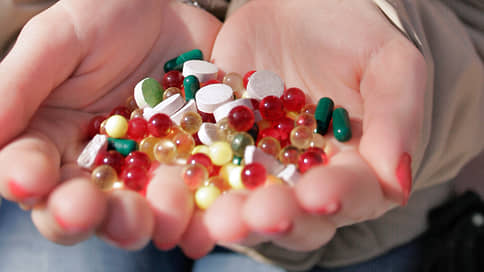There are not enough prescriptions for antibiotics – Newspaper Kommersant No. 53 (7498) of 03/29/2023
[ad_1]

Almost half of Russian doctors (44%) do not approve of the online sale of antibiotics – they believe that the state will not be able to control this process. 30% are not against such a mechanism, because they are sure that the pharmacy does not ask for a prescription for antibiotics anyway. At the same time, almost every fourth doctor (27%) does not issue a prescription for antibacterial drugs, unless the patient himself asks for it. Such data was shown by a survey of the Aktion Medicine service. On March 1, we recall, an experiment was launched on the remote sale of prescription drugs, including antibiotics. Experts believe that it will now become more difficult to sell them without a prescription.
A three-year experiment on remote sale of prescription drugs began in Moscow, Moscow and Belgorod regions. The list of drugs for online sale includes antibiotics, drugs for the treatment of diabetes, hypertension, bronchial asthma and other diseases. If the pilot is successful, the practice will be extended to other subjects of the Russian Federation.
Aktion Medicine (an expert support service for specialists from medical organizations; part of the Aktion group) asked doctors how they feel about the initiative. The survey was conducted from March 1 to 14, 566 respondents took part in it: 89% of them are attending physicians, 44.3% of respondents work in public medical institutions, 28% in private ones, the rest combine these areas.
It turned out that almost half of the doctors (44%) do not approve of the online sale of antibiotics, as they believe that the state will not be able to control this process. Another third – 30% – approve, as they believe that nothing will change. In their opinion, in the usual sale in a pharmacy, they still do not ask for a prescription for antibiotics.
Almost one in four doctors (27%) do not issue a prescription for antibacterial drugs unless the patient asks for it. The same number (25%) do not explain the rules for taking antibiotics, as there is not enough time for taking antibiotics. Specialists in private clinics are more responsible in prescribing such drugs: 58% of respondents in this category prescribe antibiotics strictly on prescription forms, while only 34% of their colleagues do so in state institutions.
Most doctors (77%) prescribe antibiotics if the patient’s temperature is 37.5 °C or higher for more than three days. Specialists of private clinics, when prescribing antibacterial drugs, more often tell patients the rules for taking them: they explain why it is impossible to interrupt the course even if the condition has improved (40.5%), give a memo or a booklet (37.4%). In public clinics, doctors do not have enough time for detailed explanations (32.7%)
More than half of the respondents (53%) answered that most often patients take antibiotics uncontrollably for viral infections. Patients also take antibiotics for COVID-19 (43%), for influenza and SARS (41%), for the prevention of viral and colds (39%). At the same time, half of the respondents emphasized that up to 80% of their patients prescribe antibiotics themselves.
Earlier, Kommersant talked about a study of the level of knowledge, attitudes and behavior of Russian citizens “in the field of antimicrobial resistance”, conducted by the Central Research Institute for Organization and Informatization of Healthcare of the Ministry of Health of the Russian Federation. The experts found that more than 70% of Russians who took antibiotics in the past six months did it wrong – either interrupted the course ahead of time, or self-medicated – for example, they drank such drugs for a sore throat or as an infection prevention.
The chief freelance microbiologist of the Russian Ministry of Health, Roman Kozlov, noted that Russians began to use antibiotics more often (including uncontrolled) during the pandemic. In the first waves of coronavirus incidence, according to him, the consumption of antibiotics in the country increased by almost a third, by 28.4%, but “thanks to the efforts of the Ministry of Health and the professional community” by the end of 2021, it returned to “pre-pandemic” indicators. Specialists, Mr. Kozlov emphasized, explain the enthusiasm for such drugs by the ignorance of patients, “some still do not know that antibiotics act only on bacteria, therefore it is useless to take them in case of viral infections.” The irrational use of antibiotics, Mr. Kozlov supports the conclusions of the researchers, can lead to more serious problems, for example, resistance (or resistance) of microbes to an antibiotic.
Thus, in the clinical guidelines for the treatment of urinary tract infections in children, it is indicated that in Russia a record level of antibiotic resistance of E. coli (E. coli) has been registered in this disease: to ampicillin – 51%, amoxicillin + clavulanic acid – 47%, to fosfomycin – 99 % and nitrofurantoin – 97%.
Aktion Medicine’s leading expert, Natalia Zhuravleva, says that, in fact, in Russia, antibiotics can be bought at pharmacies without a prescription. “This means that anyone can start taking these drugs, even if he himself decided so, a neighbor advised him, and so on. However, the patient is not necessarily infected with a bacterial infection. All this causes antibiotic resistance,” says Ms. Zhuravleva. She notes that so-called supermicrobes have already appeared – bacteria that are resistant to almost all types of antibiotics. If there are more of them, Natalya Zhuravleva emphasizes, there is a risk of rolling back to the times when people “died en masse from infectious diseases.” The online sale of medicines, the expert draws attention, suggests that doctors will prescribe them using electronic prescriptions. “This excludes the unauthorized purchase of antibiotics and “on a piece of paper”. Thus, the online channel for the sale of antibiotics will reduce one factor in the growth of antibiotic resistance – unauthorized prescription of drugs, ”she says.
[ad_2]
Source link








